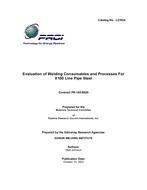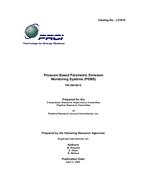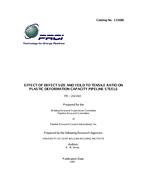Provide PDF Format
PRCI PR-185-9829
- Evaluation of Welding Consumables and Processes for X100 Steel
- Report / Survey by Pipeline Research Council International, 12/16/2002
- Publisher: PRCI
$148.00$295.00
L51924e
Edison Welding Institute
Need: The increasing demand for natural gas has resulted in the need to expand the current network of long-distance gas-transmission pipelines and to develop new pipelines. The high costs incurred during fabrication of long-distance, cross-country, and offshore pipelines can be economically justified if cost reductions can be achieved through a combination of higher operating pressures and reduced construction costs. Since pipe diameter and wall thickness dictate the material and field welding costs, one way to reduce pipeline fabrication cost is to use higher-strength line pipe steel. The use of higher-strength line pipe steels allows for a substantial reduction in material requirements and/or facilitates higher operating pressures. Additional refinement of chemical composition and processing procedures resulted in the development of higher-strength X100 line pipe steel in the early and mid-1990s. In order to realize the benefits of X100 line pipe steel for large diameter, high pressure pipelines, evaluation of welding consumables and processes that are potentially capable of depositing weld metal with sufficiently high strength and toughness was required.
Result: The primary objective of this study was to evaluate the mechanical properties of weld metals deposited using a number of commercially available welding consumables and welding processes. The secondary objectives of this work included characterizing weld metal microstructure, assessing hydrogen-assisted cracking susceptibility of the weld metal and X100 base metal, and solidification cracking susceptibility of selected welding consumables.
Benefit: All of the welding processes evaluated in this study deposited sound weld metal. Results of weldability testing indicate that the risk of solidification cracking in high-strength steel weld metal is quite low and should not be a primary factor during fabrication of X100 pipelines. Low weld metal diffusible hydrogen was measured in weld metal deposited using the solid wire and metal-cored consumables. The results of single-pass Y-groove tests indicate that with moderate preheat levels, the risk of cracking in root passes or in repair welds is low.
Edison Welding Institute
Need: The increasing demand for natural gas has resulted in the need to expand the current network of long-distance gas-transmission pipelines and to develop new pipelines. The high costs incurred during fabrication of long-distance, cross-country, and offshore pipelines can be economically justified if cost reductions can be achieved through a combination of higher operating pressures and reduced construction costs. Since pipe diameter and wall thickness dictate the material and field welding costs, one way to reduce pipeline fabrication cost is to use higher-strength line pipe steel. The use of higher-strength line pipe steels allows for a substantial reduction in material requirements and/or facilitates higher operating pressures. Additional refinement of chemical composition and processing procedures resulted in the development of higher-strength X100 line pipe steel in the early and mid-1990s. In order to realize the benefits of X100 line pipe steel for large diameter, high pressure pipelines, evaluation of welding consumables and processes that are potentially capable of depositing weld metal with sufficiently high strength and toughness was required.
Result: The primary objective of this study was to evaluate the mechanical properties of weld metals deposited using a number of commercially available welding consumables and welding processes. The secondary objectives of this work included characterizing weld metal microstructure, assessing hydrogen-assisted cracking susceptibility of the weld metal and X100 base metal, and solidification cracking susceptibility of selected welding consumables.
Benefit: All of the welding processes evaluated in this study deposited sound weld metal. Results of weldability testing indicate that the risk of solidification cracking in high-strength steel weld metal is quite low and should not be a primary factor during fabrication of X100 pipelines. Low weld metal diffusible hydrogen was measured in weld metal deposited using the solid wire and metal-cored consumables. The results of single-pass Y-groove tests indicate that with moderate preheat levels, the risk of cracking in root passes or in repair welds is low.
Related Products
PRCI PR-202-010
Effect of Defect Size and Yield to Tensile Ratio on Plastic Deformation Capacity Pipeline Steels..
$448.00 $895.00
PRCI PR-133-103
Survey and Analysis of Flue Gas Treatment Methods. Volume 2: Selective Catalytic Reduction of Nitro..
$6.00 $12.00





